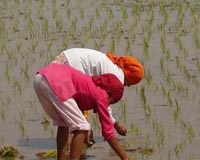 |
Christ Church, Barbados (UPI) Sep 29, 2009 Cash-strapped Caribbean countries are seeking energy independence through bioenergy development but are hamstrung by poor organization and limited initiatives. U.N. Development Program sources said recent biofuel advances in the so-called Small Island Developing States promised a greater reliance on regional resources -- "south-south cooperation" -- to cut dependence on imported fuel and food. But the targets for self-sufficiency were far from being reached because of lack of expertise, cash resources and access to new technologies, reports on recent studies and surveys indicated. Danielle Evanson, spokesperson for the UNDP and Organization of Eastern Caribbean States, told United Press International in an interview the food, financial and energy crises were compounded by climate change. The prospects for achieving sustainable development in the impoverished small states of the Caribbean were dwindling with increased reliance on imported fuel and food, studies made available by Evanson showed. An added problem was that, as economies stagnated and depended more on service industries, they suffered extra costs of importing more fuel for mobility, central to the service sector's operations. To get out of that vicious circle, Caribbean states are looking to build capacity for biofuels produced from organic waste. Technologies now exist to convert plants, garden waste and manure into charcoal, biodiesel, ethanol or gaseous fuels but are not yet available to the Caribbean states. The region is also looking more actively into wind, solar, geothermal and hydropower power. "The decline in the agricultural sectors, particularly with sugar cane and elimination of preferential trade agreements with the European Union, is driving the interest in bioenergy development for the electricity and transport sectors," UNDP said. The overarching aim is to build cooperation between the countries of the region so they can make use of sustainable energy services and enhance their energy security. A Caribbean Community Climate Change Center is coordinating moves by the small islands to increase reliance on cheap energy produced by local resources. Caribbean countries were jolted into awareness of their fragile state when, earlier in the summer, Venezuela indicated it could review preferential payment terms it offers oil-importing member states of the Petrocaribe alliance. Venezuela later denied it planned to withdraw its preferential terms for Petrocaribe partners. Petrocaribe sources said the flap brought home to Caribbean states the uncertainty of conditions in which they met their fuel needs through foreign sources. Added to that uncertainty is the growing burden of debt over fuel imports that diverts scarce cash resources into debt servicing and repayments rather than new investment into manufacturing and food processing industries. The biofuel industry's development has also been hampered by lack of cash resources. UNDP said new technologies could greatly influence the region's capacity to exploit its natural resources to produce energy. After hurricane damage to wind farms, for example, experts are recommending deployment of turbines that can be removed at short notice to save them from being wrecked in stormy weather. Share This Article With Planet Earth
Related Links Bio Fuel Technology and Application News
 Biogas brings 'green revolution' to rural Nepal
Biogas brings 'green revolution' to rural NepalBadrahani, Nepal (AFP) Sept 29, 2009 Nepalese villager Khinu Darai used to have to walk about five kilometres (three miles) every day to collect firewood so she could cook meals for her family. Then two years ago, she bought a biogas plant under a government scheme to encourage villagers to convert to greener energy -- an event the 30-year-old mother of three says transformed her life. "Biogas is a blessing for my family. ... read more |
|
| The content herein, unless otherwise known to be public domain, are Copyright 1995-2009 - SpaceDaily. AFP and UPI Wire Stories are copyright Agence France-Presse and United Press International. ESA Portal Reports are copyright European Space Agency. All NASA sourced material is public domain. Additional copyrights may apply in whole or part to other bona fide parties. Advertising does not imply endorsement,agreement or approval of any opinions, statements or information provided by SpaceDaily on any Web page published or hosted by SpaceDaily. Privacy Statement |